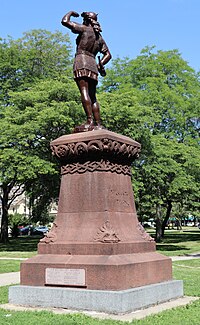Leif, the Discoverer (Whitney)
| Leif, the Discoverer | |
|---|---|
 | |
 | |
| Artist | Anne Whitney |
| Year | 1887 |
| Type | Public Art, Sculpture (bronze, red sandstone) |
| Dimensions | 240 cm (96 in) |
| Location | Milwaukee, Wisconsin, U.S. |
| 43°2′39.258″N 87°53′50.911″W / 43.04423833°N 87.89747528°WCoordinates: 43°2′39.258″N 87°53′50.911″W / 43.04423833°N 87.89747528°W | |
Leif, the Discoverer is a bronze sculpture of Leif Ericson created by American sculptor Anne Whitney in 1887. It is located at Juneau Park in Milwaukee, Wisconsin, United States.
Description[]

The figure is approximately 8 feet tall; the upper base is approximately 110 x 84 x 84 inches; the lower base is approximately 12 × 9 x 96 inches. The sculpture is bronze; the base is red sandstone.[1]
Shading his eyes to scan the distance, Leif Ericson stands on a large red sandstone pedestal. Unlike other depictions of Ericson, here he is youthful and clean-shaven. He wears a scale armor shirt, ornamented with breast plates and a studded belt. Underneath, he wears a tunic and leggings with leather sandals. He carries a powder horn over his shoulder and a knife in a decorative sheath at his side. On the sandstone base, the inscription reads, Leif, the discoverer/ son of Erik/ who sailed from Iceland/ and landed on this continent/ A.D. 1000. In runic letters, it also reads, Leif, son of Erik the Red.[1]
History[]
The original statue resides in Boston, Massachusetts on Commonwealth Avenue. In November 1887, the Milwaukee replica was erected; however, at the request of its donor, Mrs. Joseph Gilbert, there was no dedication ceremony.[2] On 26 April 2003, the Sons of Norway Fosselyngen Lodge held a ceremony to celebrate the recent addition of the statue's lighting, which cost $3,800. The funds were bequested by the late lodge member, Duane Olson. The addition was a joint effort between the Sons of Norway Fosselyngen Lodge, Milwaukee County and the city of Milwaukee.[3] Prior to this, there had been evidence of structural instability, through cracks, erosion, and the deterioration of caulking in a pedestal.[1]
See also[]
References[]
- ^ a b c "Leif, the Discoverer, (sculpture)". Save Outdoor Sculpture!. Smithsonian Institution. 1992. Retrieved 10 December 2010.
- ^ Federal Writers' Project; Norman K. Risjord (May 2006). The WPA Guide to Wisconsin: The Federal Writers' Project Guide to 1930s Wisconsin. Minnesota Historical Society Press. pp. 259. ISBN 978-0-87351-553-5.
- ^ "Leif Eriksson". Leif Eriksson Monuments Pages. René & Peter van der Krogt. 2003. Retrieved 10 December 2010.
- 1887 establishments in Wisconsin
- 1887 sculptures
- Bronze sculptures in Wisconsin
- Cultural depictions of Leif Erikson
- Monuments and memorials in Wisconsin
- Outdoor sculptures in Milwaukee
- Sculptures of men in Wisconsin
- Statues in Wisconsin
- Statues of explorers

